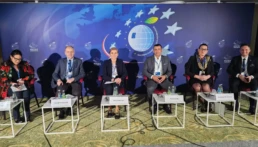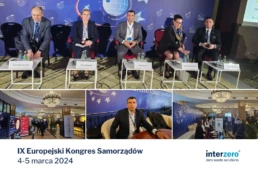Summary of the 9th European Congress of Local Governments Economic Forum
On March 4-5, 2024 The 9th European Congress of Local Governments took place in Mikołajki. Pawel Lesiak , Vice-President of the Management Board, took part in the event on behalf of Interzero. The theme of this year's edition was "The future of the idea of decentralisation in a changing world."
Technological development, social changes and challenges
Local government reforms have brought Europe decades of effective economic growth and regional development. The local government reform in the Third Polish Republic is considered one of the best, enabling effective absorption of EU funds, participation in cross-border programmes and implementation of strategic regional projects.
However, serious turbulence, both in Poland and throughout Europe, in recent years has had a negative impact on the process of decentralisation of power. The pandemic caused a sudden disruption of supply chains, which undermined the idea of borderless globalisation, leading to the consolidation and centralisation of power. During this edition, the focus was on building a vision of effective, modern and proactive local government. There were also topics related to environmental protection and recycling.
The deposit system as a positive example of recycling
The discussion panel "Return of plastic bottles for a deposit - positive examples of recycling". was attended by:
- Paweł Lesiak - Vice-President of the Management Board, Interzero Packaging Recovery Organization SA
- Katarzyna Michniewska - President of the Management Board, Eco Cycle Packaging Recovery Organization SA
- Konrad Nowakowski - President, Polish Chamber of Recovery and Packaging Recycling
- Anita Palukiewicz - Partner, SSW Pragmatic Solutions
- Jakub Sprusiński - Director of Product Development and Sales, T-MASTER SA
The moderator of the discussion was Agnieszka Sznyk, President of the Management Board, INNOWO.

In 2025, the obligation to collect plastic bottles will amount to 77%, and ultimately from 2029 - 90%. This is a requirement resulting from the provisions of the SUP Directive. Achieving such high levels will only be possible through a deposit system - currently approximately 45% of plastic bottles are collected. So in 2025 we will be 32% short. Deposit systems will only be launched in 2025, so their full functionality will be spread over time.
Are the planned collection levels realistic to achieve?
This does not mean, however, that achieving the level in 2025 is at risk. The deposit will significantly influence the willingness to return the packaging. An example here are aluminium cans, which are currently collected at levels exceeding 70% despite the lack of deposits and a universal collection system. However, the value of the raw material (approx. PLN 5 per 1 kg) encourages collection and transfer to collection points. There are about 55 cans per 1 kg, so by handing over a can to a collection point, you get approx. 2 groszy per piece. If the deposit rate is at least PLN 0.50, the collection level will certainly not be lower than currently. Similarly high levels can also be achieved in the case of plastic bottles.
Collecting bottles in the deposit system will allow you to separate this waste from other waste, which will ensure its appropriate quality required for the production of recyclate intended for the production of packaging in contact with food. In 2025, the required level of recyclate share in plastic bottles will be 25% and in 2030. 30%.
The PPWR regulation provides for an increase in the share of recyclate in bottles to 65% by 2040. PPWR assumes that from 2030, a level of recyclate will be required in all plastic packaging. In 2025 EU regulations require a 50% and in 2030 55% level of recycling of plastic packaging waste. PPWR assumes that the European Commission may propose more ambitious recycling targets, including for plastics.
Necessary statutory changes
Removing plastic bottles from the municipal waste stream will reduce municipalities' income from the sale of this waste collected from residents. It is therefore necessary to quickly introduce ROP regulations adapted to the new requirements of the Waste Directive, which will increase the participation of entrepreneurs in financing the costs of waste collection in municipalities.
Changes to the security deposit regulations signed by the ministry cannot introduce revolutionary changes that would disrupt the assumptions of its operation adopted in the Act. Nevertheless, it is necessary to introduce several changes to improve its functioning in the future, e.g. the creation of an umbrella organisation that will, among others, settle centrally collected and returned deposits.
It is also necessary to enable the transport of cans and bottles constituting waste from stores by vehicles that deliver products to stores (amendments to the Waste Act). This will reduce the number of people collecting packaging from stores, which will reduce the carbon footprint.
The idea of using commercial infrastructure to store or sort collected packaging without the need to obtain a waste collection permit granted in a long administrative procedure is also important.
You can read more about Interzero's role in the Polish deposit system HERE
Check out our offer of recyclers HERE
